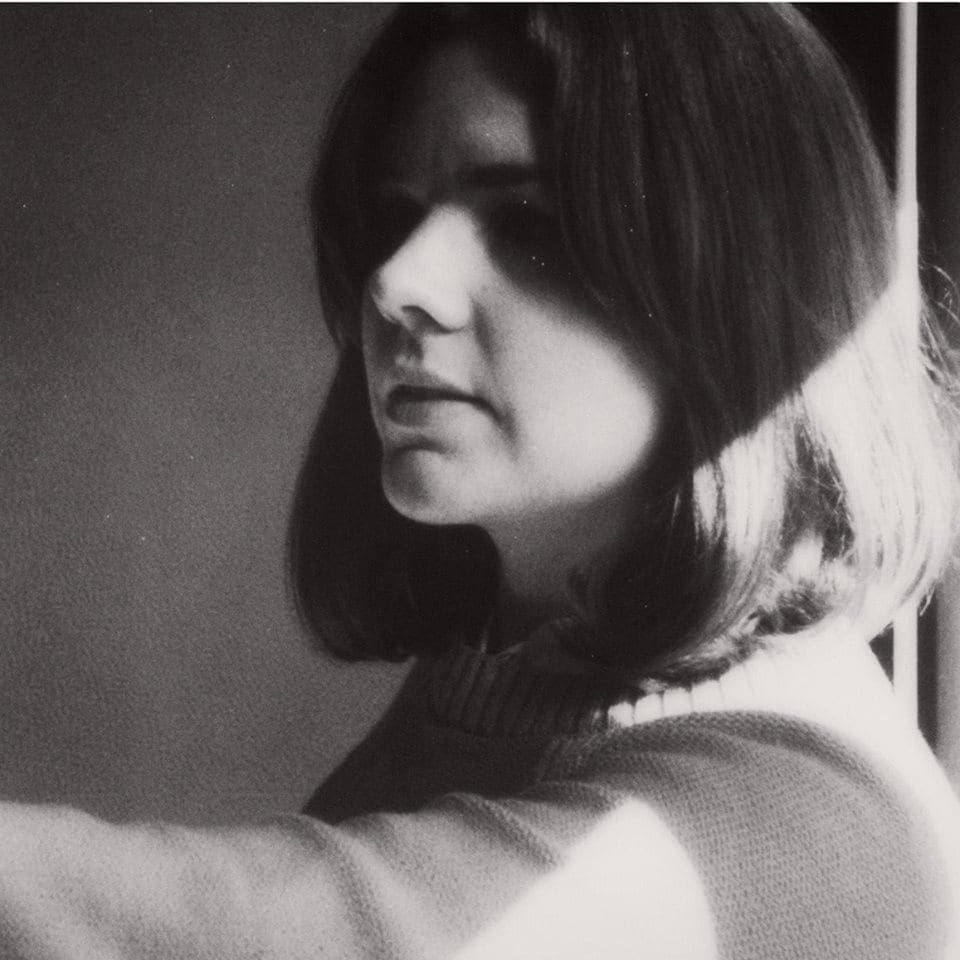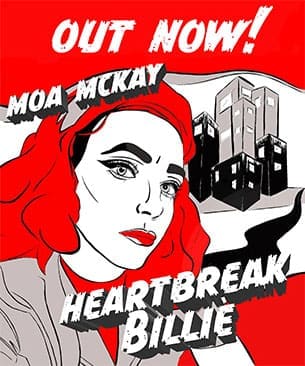Celebrating the release of their third full length album Olympic Girls, New Zealander indie-folk band Tiny Ruins performed last Wednesday night in a packed Privatclub.
Berlin based “dreamy noise pop” band Highest Sea played a killer opening set. While the mostly mature-adult crowd of Jack Wolfskin wearing attendees wasn’t yet set to rock out like the band maybe would have liked, their performance was superb. They played songs Hawaii, La Belle Soledad, and Wait for the Night —all off their EP Haunted Hearts from local label Späti Palace— as well as new material they’re excited to release soon.
Save for some swaying, the mostly motionless floor was still very tuned into front-women Leila Zanzibar’s deeply mesmerizing vocals, rad riffs and pleasant stage presence. As their last song ended, one man yelled out “Wunderbar!”, speaking for everything – don’t miss them opening for Juniore tomorrow night at Auster Club.
Shortly before Tiny Ruins came on, band members Cass Basil (bass) and Alex Freer (drums) sneaked on stage and quickly laid an array of yellow Christmas lights across the mic stands and instruments. It brought a nice touch of warmth to the whole space. Without much wait, the four-piece from Auckland —featuring front-woman Hollie Fullbrook on vocals and acoustic guitar, and including Tom Healy on electric guitar and percussion— opened with How Much.
Most of the new album was played, including singles Holograms and School of Design, as well earlier work from their second album Brightly Painted One and Dream Wave, from the self-titled 2016 EP produced by director David Lynch.
The bright yellow glow of the lighted stage highlighted the magically mellow mood of the music. Fullbrook and others made jokes about the German language and their oddities while on tour in-between songs, not letting an awkward pauses go by and making the set a little more intimate and cheerful. Olympic Girls, whose live acoustic guitar sounded even better than the recording, was second to last, before an excited applause encouraged an encore that ended a wonderfully wholesome Wednesday evening.
– – – – –
indieBerlin was lucky enough to sit down with Hollie Fullbrook for an interview before the show. She was nice enough to squeeze us in just before she sped off to play a short acoustic set for Radio Eins (and then rushing back to Privatclub).
[This Interview has been edited for clarity and brevity].
indieBerlin: How did you come up with the name Tiny Ruins?
Hollie Fullbrook: I started off recording just on my own, recording bedroom demos at home, and at the time I was terrified of putting my music online. I put it on MySpace actually. I remember it being this big decision. Kind of like putting your music on Bandcamp now, I guess. But it was really terrifying and I didn’t want to have my own name attached to what felt like really personal songs. So, I was thinking about a name – not really as a pseudonym, but as a name for the project or a name for the songs– and I was leafing through lots of books to try to get ideas for names. One of the books that I was leafing through was Jean-Paul Sarte’s Nausea…and I feel kind of lame when I say this because I only got half way through the book [laughs]…
iB: I only got half way through it, too [laughs]…
HF: [laughs]…yeah, but I found a paragraph where the protagonist is terrified of putting all of his effort and heart into something. I think he’s actually talking about a relationship, because he knows that two or three months down the track he’ll wake up to “fresh ruins”. And I liked that idea, but I thought, No, that’s quite right… hmmm, the word fresh? And then right at that moment a song by a blues musician called Tiny Bradshaw came on. It was “She’ll Be Coming Around the Mountain”. And so I just kind of put the two together and for some reason Tiny Ruins worked. I felt like it described the demos I had made. These scrappy demos which felt like little ideas that I hadn’t finished.
iB: Do you have any philosophical or literary influences?
HF: Yeah, lots. I love buying lots of books and having them around me. I might not read them all, but I like trying to get out of my own circular thinking and to try to get into a creative mind set. I find it really fantastic to have stacks of book of poems around me. I leaf through them and it gets me into this world of words and thinking in a more visual way. Though I would also say that some songs have been influenced by tabloid news stores as much as high literature [laughs].
iB: Can you tell me more about the song School of Design?
HF: School of Design is based on a true story where I came across this design school which was being repainted. It’s actually one of my more political songs. It’s kind of saying, look at how unimaginative a lot of the systems are around us and how based in the past they are. The song is about wondering around this place that is meant to be where all these new ideas are created and where everything is set in stone and where people go to learn about aesthetic beautiful. But there’s this feeling of oppression. I actually get this feeling in Europe, where there’s this weight of history.
iB: Was this school in London by chance?
HF: No it wasn’t [laughs]… it was a European city. I don’t have answers, like, this is how things should be. But it’s that feeling that you get where it’s, like, man, I want to escape this, like, can’t we escape this? Can’t we get past this really utilitarian, really beautiful designed, but too designed kind of thinking?
iB: I think I have the same feeling about most of the new German architecture here. All the new buildings going up right now in Berlin are all very sleek and minimal, but lacking a lot life, too.
HF: Yeah, when I first wrote the song I felt like it was too strong of a statement, but after so much time passed I decided to keep and own it [laughs]… and it’s funny because people really seem to connect with it, when we play it live especially.
iB: Can you tell us about what’s going on in the video for Holograms?
HF: The song is about the idea that were gonna be immortalised by digital versions of ourselves, our like holographic versions of ourselves —you know, we’ve already got holographic versions of Elvis beaming into lounges [laughs]— and it kind of came out of reading about stories about how holograms were developing so quickly. Then I got into reading about what holographic images actually are. It’s really old school process similar to photography where you’re casting light on a 3D object with a lot of chemical processes involved. There’s this great YouTube video that shows the process. Anyways, the song is about a feeling of wanted to stay connected, but feeling increasingly not.
The video was a very homemade/DIY affair. We got together with this great director called Martin Sagadin who’s directed a bunch of videos for friends of ours. We talked briefly about the video but it wasn’t until he flew up to my house, where we made it, including in the garden, when we got the idea. I’m not sure if the narrative makes sense to anybody, but it was more a feeling that we wanted to get out there.
I find it really fantastic to have stacks of book of poems around me. I leaf through them and it gets me into this world of words and thinking in a more visual way.
iB: In an interview, you said Olympic Girls was about Olympic gymnasts and also freedom. How do gymnasts represent freedom to you?
HF: That was a really big song and there’s a lot going on and so I feel kind of reluctant to shed light on the story but, I will say that part of the story was inspired by someone I met on a greyhound bus while travelling through America when I was 18 or 19. The man had just got out of prison, he was just released that morning, and he was taking the same thirteen hour bus to Chicago as I was. He wasn’t that much older than me and he had been in for three years on drug charges. And so he gave me the run down on the whole broken justice system and racist cops and how his housing projects had been rained and how he got caught up in that. But we also talked about our lives and music and so we really got to know each other well on this bus drive. And then we got there and it was like, “okay, well good bye then” and I thought of him trying to find a job after just getting out of jail, like just getting on with the rest of his life.
It’s always stayed with me about how we both were really young and I was in such in a different position. So the song is about what freedom means to different people. The Olympics was something he talked to me about. The prisoners liked to watch the Olympics in jail. It was one of the ways in which they felt they were seeing the outside the world, like seeing the gymnasts —the beautiful women and their costumes and their glory and the freedom that you would have with their body, doing crazy things in the air. So this image really stayed with me. The song was originally called Under the Same Cover, and then about a year after I thought, I think it needs to be a different title, and then I made it the album title.
iB: What was it like working with David Lynch?
HF: It was really wonderful. He’s a magical person. He’s just like kind of how you’d want him to be. He’s really down to earth and kind, but he’s definitely Mr. Mysterious. The first thing he did was offer to make me coffee, an “Americano” [in American accent] [laughs]. We sat and drank coffee for ages and then we did some recording, but it was mostly just sharing stories and hanging out. He showed me some YouTube clips. Yeah, he’s a fantastic. I feel really grateful to have met him.
iB: Has streaming change the way you think about making music?
HF: No, it hasn’t really. It has in terms of the strategy of releasing the album, like which singles to release and spacing them out and making them their own individual releases, which I think people didn’t used to do as much…and the videos. I definitely didn’t think about it when I was writing or recording. But then when you have the materials, you think about, like, okay, how and I gonna get this to people? In some ways Spotify is fantastic.
I was anti-Spotify for ages, but I’m quite grateful to them for putting the tour dates on your page. They alert your followers when you’re touring and often we have people at our shows who tell us, “I saw you were touring on Spotify”. I think there was so much thinking recently about the music industry dying, but I think it’s got a way to go and I think Spotify and the future of Spotify is gonna have an incredible responsibility to artists in terms of giving them power over their streaming page and letting them communicate with their fans on their page.
iB: More like MySpace?
HF: [Laughs]… Yeah, like MySpace.
Piqued your interest? Take a look at Tiny Ruins’ Facebook and Instagram for updates on upcoming shows.


